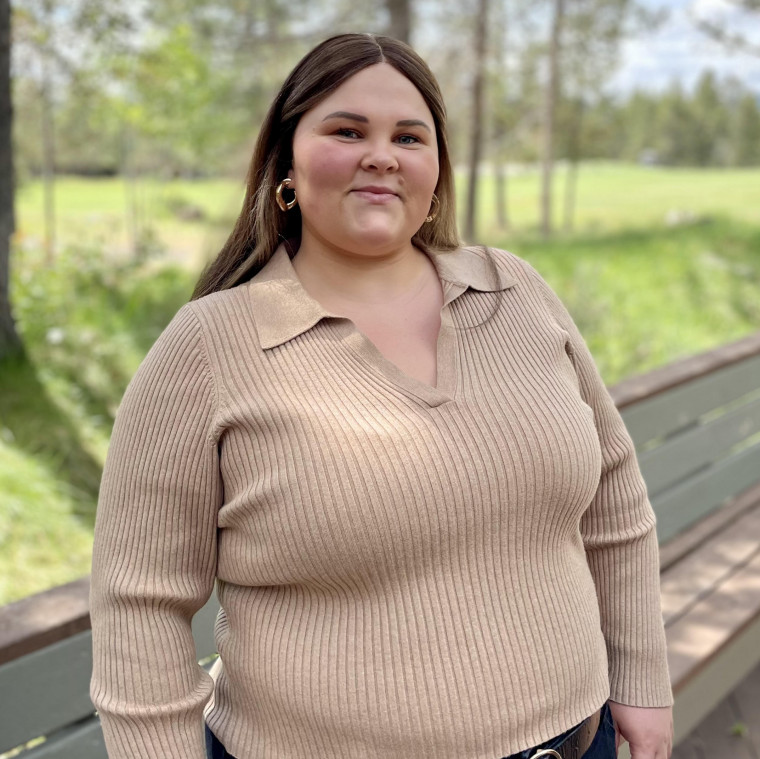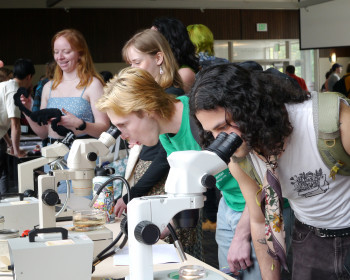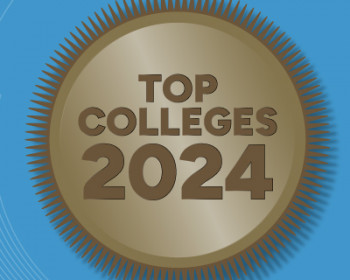Emily Davis
I learned to be myself at Lewis & Clark.

Pronouns
Degree and Class Year
Hometown
Current City
Major
Extracurriculars
Job Title, Organization
Internship
What three words would you use to describe L&C?
What made you want to come to Lewis & Clark?
I came to Lewis & Clark as a transfer student. Fresh out of high school at 18 years old, I attended a very large university predominantly centered around its sports teams and Greek life; I felt so lost in the crowd and out of my element. After my sophomore year, I took a year off to figure out what I wanted to do and then decided to transfer. I wanted to find a small, liberal arts college that valued community, fostered critical thinking, and valued academic excellence. I applied to several colleges up and down the West Coast, however I was particularly struck by both Lewis & Clark College and the city of Portland. Several friends living in Portland at the time loved the area and encouraged me to visit the city and tour the campus. Of course, Lewis & Clark is a beautiful campus, both in the landscaping and the buildings. I transferred to Lewis & Clark because it offered me everything I wanted and needed in a college experience at 18 years old, except by then I was 23 and ready to make full use of it! It gave me a bustling community full of activities and events pertinent to my interests. It gave me rigorous academics that challenged me and extracurriculars I felt passionate about pursuing. It gave me friends and professors who cared about me. It gave me Portland, an incredible city with so much to offer young people. It gave me the space to cultivate myself into the person that I wanted to be.
What have you been doing since graduation?
Since graduation, I have worked as a nonprofit consultant in Portland. The consulting company I work for serves statewide and regional nonprofits, public and private grantmaking foundations, philanthropic organizations, public agencies, sovereign Tribal entities, and more to help them achieve their big, bold visions through high-quality, holistic technical assistance. We work to deepen the philanthropic sector’s impact through curated grant-making support, strategic new partnerships, and value-add initiatives to expand investments. I also served on the Board of Directors for Young Nonprofit Professional Network Portland (YNPN Portland) for about two years. YNPN Portland is a volunteer-led and -run organization that supports current and future nonprofit and community leaders by connecting them to training, networking events, online communities, service opportunities, and other means of professional development. This organization supports the development of young professionals to strengthen their role in a viable, inclusive, and collaborative nonprofit sector.
How did Lewis & Clark prepare you for professional work?
Lewis & Clark prepared me for post-grad professional work in several ways. Of course, I received a stellar education and learning to balance demanding extracurriculars and academics prepared me for a professional career. I also learned to better advocate for myself, ask for support when necessary, and build relationships. My time spent volunteering at Lewis & Clark’s Feminist Student Union really got my wheels turning about pursuing a professional career in the nonprofit sector. When I graduated, I found a great job that balances my interests in social justice and philanthropy with my educational background in writing.
What would you say is the most important thing you learned at Lewis & Clark?
This may sound cheesy, but I learned to be myself. I have always been very independent, and Lewis & Clark gave me the space to learn about my interests, explore my passions, and find my community. College is what you make it; Lewis & Clark provides the resources, support, and structure—your experiences can be tailored to your liking.
Why did you major in English?
I decided to major in English at my previous college, where I was focused on the creative writing track. I have always enjoyed both creative and technical writing, and wanted to pursue a degree to bolster this skill. When I decided to transfer to Lewis & Clark, I learned that creative writing is offered as a minor, not a separate track within the English major. While I ultimately decided not to pursue the additional minor, I immensely enjoyed majoring in English.
How do you stay connected to Lewis & Clark as an alum?
I mainly stay connected to Lewis & Clark via community events. Most recently, the current Feminist Student Union leadership invited former leadership, including myself, to attend the speaker event they hosted to bring Lewis & Clark alum Monica Lewinsky BS ’95 to present a public talk focused on “Social Activism, the Price of Shame, and Resilience.” I really enjoyed her presentation, her grace, and the moment of realization that in that brief hour, she and all of us were alums back on our old stomping grounds, having all been impacted by Lewis & Clark in some way.
Additionally, about a year after graduation, I jumped on the opportunity to take an online, noncredit course for alums titled The Moral Machine: A Humanistic Approach To Artificial Intelligence and Big Data held by one of my favorite professors at Lewis & Clark, Associate Professor of Philosophy Joel Martinez (seriously, check out one of his classes). This class was held online, and we met weekly to discuss how “our civilization is developing technologies related to artificial intelligence and data science at a rapid pace. Humanistic disciplines, like philosophy, history, and the arts offer many resources for adapting and confronting these profound technological advancements.” It was an excellent class! It’s great that Lewis & Clark offers ongoing opportunities for alums to learn and engage in ways compatible with work and post-grad lifestyles. I’m excited to take more classes in the future.
How do you describe the liberal arts?
A liberal arts education is a multi-faceted style of learning that provides students with a well-rounded groundwork for their personal and professional lives. The liberal arts require people to learn how to think critically, engage in analytical reasoning, and broaden their perspectives. Through a liberal arts education, people develop essential life skills to become effective communicators and engaged citizens.
What was your favorite class? How did it expand your knowledge?
I liked all my English classes, but one of my favorites was a summer course in the creative writing program called Prose Writing: Creative Nonfiction with Professor Reed. The classes focused on memoir writing; we read several engaging memoirs and had the opportunity to write two short versions of our own. Since it was a summer course, the classes were once a week for several hours with only about 10 students, so we really got to know one another and provide in-depth feedback. I found the class content appealing and the experience of writing my mini-memoirs cathartic.
Where did you find your community on campus?
I found my community in my classes and extracurriculars. In my first semester, I found a community with the Association of Non-Traditional Students (ANTS). This club was founded for students older than the average student body, many of whom lived off campus and did not have the built-in community of the dorms. These students made my transfer transition easy!
Mainly, I found my community with the Feminist Student Union. I absolutely loved it! The community, my friends, the events, our impact—the Feminist Student Union was a huge part of my time at Lewis & Clark, and it truly made my time there so incredible. I highly recommend joining a student union!
Who was your mentor on campus? Why do you consider this person your mentor?
There are two people who had a significant impact on my time at Lewis & Clark.
First is Associate Professor of English Rachel Cole. Rachel was my academic advisor at Lewis & Clark, and I also had the pleasure of taking one of her classes. She helped me curate my schedule to maximize my academic interests, always took the time to listen to my concerns, and never failed to offer personal and professional support. I felt supported as a student and as an individual by Rachel, and I credit my ability to try so many unique classes, both in the department and beyond, to her ability to take my interests and guide my decision-making. I really lucked out with my advisor!
Second is Associate Professor with Term of Humanities Kimberly Brodkin. I first met Kim through my work with the Feminist Student Union, where Kim served as the academic advisor. I also had the pleasure of taking one of her classes and participating in the 2019 Gender Studies Symposium, of which she is the director. Kim helped foster my interest in gender studies, engaged me in work that broadened my perspectives, and encouraged me to take action. Developing relationships with faculty, in addition to peers, is what made my experience whole and impactful.
More Admissions Stories
Admissions is located in Frank Manor House on the Undergraduate Campus.
MSC: 32
email admissions@lclark.edu
voice 503-768-7040
fax 503-768-7055
Vice President of Admissions and Financial Aid
Eric Staab
Admissions
Lewis & Clark
615 S. Palatine Hill Road MSC 32
Portland OR 97219

